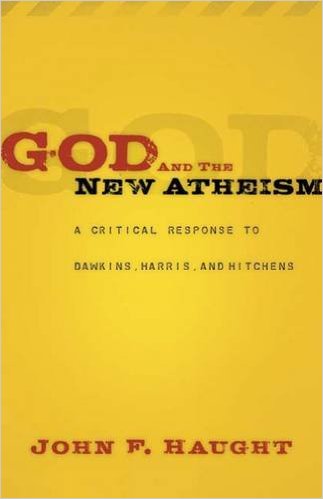Book Review: God and the New Atheism
God and the New Atheism:
A Critical Response to Dawkins, Harris, and Hitchens
by John F. Haught
Review by Ben Tameling
In recent years, the writings of the so-called “New Atheists” have punctured the public consciousness with their insistence that God is a “delusion,” that religion leads to “terror,” and “poisons” everything. These bestselling books have wide readerships and suggest that atheism is on the rise while traditional religion is destined to fade away.
John F. Haught, a leading thinker on the intersection of faith and science, responds to these writers in his book, God and the New Atheism by asserting that this atheism is not “new” at all, or well-thought out or as consistent as the atheists of centuries past. In the bulk of the book, Haught undermines the main arguments of these atheistic writers by highlighting their relative ignorance of seasoned, rigorous theology, as well as their mistaken equating of science with naturalism.
The new atheists claim that because religion produces suffering, getting rid of faith will make everything better. Yet, as Haught points out, “faith” is not reducible to a set of unprovable intellectual propositions, but a “state of self-surrender” in which one gives one’s whole being away to the divine mystery that “is much deeper and real than anything that could be grasped by science and reason.”
Haught shows the shallowness of the new atheists’ reasoning compared to thinkers in the past two centuries such as Freud, Marx, Nietzsche, etc. He points out that their fatal flaw is their concept of scientism: that science alone provides us with truth. This is self-contradictory, for there is no way of proving scientifically that science alone can give us absolute, full truth. Relatedly, he argues, though “there is no good theological reason to object to understanding religion in scientific terms, even evolutionary terms,” the idea that evolution has disposed of the need for God also betrays a mistaken notion of what science can and cannot ultimately, metaphysically tell us.
By contrast, Haught admires the “old” atheists for their bravery and intellectual honesty to think through the consequences of atheism to the bitter end. Haught boldly suggests that if you aren’t willing to risk madness, then you’re not really an atheist. He emphasizes that the new atheists have targeted fundamentalist Christianity rather than robust theology, because if they engaged with in-depth theological arguments, their own claims would be exposed as rather thin.
One controlling theme that Haught returns to repeatedly throughout these chapters is that of dual causality, or multiple layers of meaning. “It makes no sense to argue that the page you are reading can be explained by the printing press rather than by the author’s intention to write something,” and by implication, neither does one have to choose between evolution and divine intention when considering the intersection of faith and science.
Overall, Haught does a masterful job at addressing the arguments of the new atheists, and in so doing does a service to all Christian readers to ponder more deeply the way their faith integrates with science. For in the end, the kind of “righteous anger” that Dawkins, Harris, and Hitchens express toward religion betrays their own sense of ultimate justice and rightness that they are operating from as they criticize religion. Their desire to have a purified knowledge in the form of science opens a door for Christians to witness to the truth of the gospel, the good news of God incarnating himself in the middle of history as Jesus Christ. Haught observes that much of the new atheism of today demands that “religions…provide perfect representations of God (suitable to their tastes)…but Christianity tolerates ambiguity and imperfection in the Bible’s struggle to imagine God.” Christianity affirms God incarnate embracing the world in all of its imperfections and experiencing death on a cross.
Ironically, the desire of the new atheists to have one, clear answer to the issues raised by faith and science interacting with each other mirrors the need for certainty found in the religious fundamentalism they so vehemently denounce. May we as Christians humbly submit to the mystery of God at work in creation and at the Cross, and through scientific discovery be called not to idolatrously reduce, but to worshipfully expand our trust in the Father, maker of heaven and earth.

